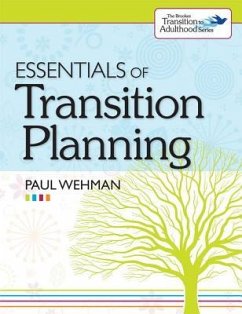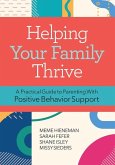Paul Wehman
Essentials of Transition Planning
Schade – dieser Artikel ist leider ausverkauft. Sobald wir wissen, ob und wann der Artikel wieder verfügbar ist, informieren wir Sie an dieser Stelle.
Paul Wehman
Essentials of Transition Planning
- Broschiertes Buch
- Merkliste
- Auf die Merkliste
- Bewerten Bewerten
- Teilen
- Produkt teilen
- Produkterinnerung
- Produkterinnerung
An invaluable one-stop guide to well-crafted transition plans, this book is a must for anyone supporting young people with disabilities as they cross the bridge to adulthood. Includes ready-to-use checklists and tools and practical, research-based guidanc
Andere Kunden interessierten sich auch für
An invaluable one-stop guide to well-crafted transition plans, this book is a must for anyone supporting young people with disabilities as they cross the bridge to adulthood. Includes ready-to-use checklists and tools and practical, research-based guidanc
Produktdetails
- Produktdetails
- Verlag: Brookes Publishing Company
- Seitenzahl: 200
- Erscheinungstermin: 30. September 2010
- Englisch
- Abmessung: 280mm x 215mm x 9mm
- Gewicht: 481g
- ISBN-13: 9781598570984
- ISBN-10: 1598570986
- Artikelnr.: 30506393
- Herstellerkennzeichnung
- Libri GmbH
- Europaallee 1
- 36244 Bad Hersfeld
- gpsr@libri.de
- Verlag: Brookes Publishing Company
- Seitenzahl: 200
- Erscheinungstermin: 30. September 2010
- Englisch
- Abmessung: 280mm x 215mm x 9mm
- Gewicht: 481g
- ISBN-13: 9781598570984
- ISBN-10: 1598570986
- Artikelnr.: 30506393
- Herstellerkennzeichnung
- Libri GmbH
- Europaallee 1
- 36244 Bad Hersfeld
- gpsr@libri.de
William Grant Revell, Jr., M.S., M.Ed., served as a research associate at Virginia Commonwealth Universityâ (TM)s Rehabilitation Research and Training Center. He has extensive experience in the areas of policy analysis and funding related to state and national implementation of community-based employment supports for individuals with significant disabilities. He has served as a project director for a variety of national technical assistance and research projects, including the National Supported Employment Technical Assistance Center. He also worked for 15 years for the Virginia Vocational Rehabilitation Agency as a counselor and as the state-supported employment program supervisor. PaulWehman, Ph.D., is Professor of Physical Medicine and Rehabilitation, with joint appointments in the Departments of Rehabilitation Counseling and Special Education and Disability Policy at Virginia Commonwealth University (VCU). He serves as Chairman of the Division of Rehabilitation Research in the Department of Physical Medicine and Rehabilitation at the Medical College of Virginia. Dr. Wehman has his doctorate in behavioral disabilities from University of Wisconsin-Madison. He helped to develop supported employment at VCU in the early 1980s and has published more than 200 articles and authored or edited 40 books primarily on transition, severe disabilities, and employment for people with disabilities. He received the Kennedy Foundation Award in Mental Retardation in 1990 and the Distinguished Service Award from the President's Committee on Employment for Persons with Disabilities in 1992. He received the Lifetime Achievement Award from the Association for Persons in Supported Employment (APSE) in 2006 and the VCU School of Medicine Research Recognition Award in 2007. Dr. Wehman was also recognized as one of the 50 most influential special educators of the millennium by the Remedial and Special Education journal in December 2000. He is Editor-in-Chief of the Journal of Vocational Rehabilitation. Pamela Sherron Targett, M.Ed., has worked in the area of disability and employment since 1986. For 22 years she oversaw the day-to-day operations of a fee-for- service supported employment program that assisted individuals with significant disabilities with going to work. During this time she also worked with schools to develop community-based vocational education programs. Her special interests include transition to work for youth with disabilities and individuals with significant support needs, such as brain injury and autism. Dr. Wehman is Professor of Physical Medicine with joint appointments in the Departments of Rehabilitation Counseling and also Special Education and Disability Policy at Virginia Commonwealth University. He serves as Chairman of the Division of Rehabilitation Research in the Department of Physical Medicine and Rehabilitation. Dr. Wehman has his Ph.D. in Behavioral Disabilities from University of Wisconsin-Madison. As one of the original founders of supported employment, he has worked closely with business and industry since 1980 and has published over 200 articles and authored or edited more than 40 books primarily in transition, severe disabilities, autism, traumatic brain injury and employment for persons with disabilities. He has been the Principal Investigator on 41 million dollars in grants during his career. As the father of two young adults with disabilities, he brings a strong parental as well as business perspective to his work. He is highly active in speaking to professionals, parents, advocates and businesses on transition and employment for people with autism, traumatic brain injury, spinal cord injury and other developmental disabilities. On a daily basis he works with individuals with disabilities, communicates regularly with professionals in the world of business related to disability and diversity, and is active in teaching and mentoring medical students, residents, and doctoral students in rehabilitation medicine, special education, rehabilitation and psychology. A major focus of Dr. Wehman's work is on expanding the partnerships with businesses of all sizes so that more persons with disabilities can gain entrance into the workplace and retain employment successfully. He is a recipient of the Kennedy Foundation Award in Mental Retardation in 1990 and President's Committee on Employment for Persons with Disabilities in 1992. Dr. Wehman was recognized as one of the 50 most influential special educators of the millennium by the Remedial and Special Education journal in December, 2000. He is also Editor-in-Chief of The Journal of Vocational Rehabilitation. Renee Cameto, Ph.D. Senior Social Science Researcher SRI International 333 Ravenswood Avenue Menlo Park, California 94025 Teresa Grossi, Ph.D., is Director of the Center on Community Living and Careers at the Indiana Institute on Disability and Community at Indiana University. Debra Hart is the Director of the Education and Transition Team for the Institute for Community Inclusion at the University of Massachusetts, Boston. She serves as the Principal Investigator for the NIDRR funded Center on Postsecondary Education for Individuals with Intellectual Disabilities, the ADD funded Consortium on Postsecondary Education for Individuals with Developmental Disabilities and Office of Postsecondary Education funded National Coordinating Center. Debra has over 25 years of experience working with youth and adults with disabilities, their families, faculty, and professionals that support youth in becoming contributing valued members of their community via participation in inclusive secondary and postsecondary education, and competitive employment. Since 1997, Ms. Hart has directed five federal grants designed to create access to postsecondary education for youth with intellectual disabilities. Peg Lamb, Ph.D. Director High School Diploma Completion Initiative Lansing Community College Post Office Box 40010 Lansing, Michigan 48901 Dr. David W. Test, Ph.D. Professor of Special Education at the University of North Carolina at Charlotte, teaches courses in single subject research, transition, classroom management, and professional writing. The majority of Dr. Test's publications have focused on self-determination, transition, community-based training, and supported employment. Along with Dr. Nellie Aspel and Dr. Jane Everson he wrote the first transition methods textbook titled Transition Methods for Youth with Disabilities. Dr. Test currently serves as a Co-Principle Investigator (with Dr. Paula Kohler and Dr. Larry Kortering) of the National Secondary Transition Technical Assistance Center, Co-Director on the North Carolina Indicator 14, Postschool Outcomes Project (with Dr. Claudia Flowers), and the UNC Charlotte Doctoral Leadership Personnel Preparation Program (with Dr. Diane Browder). He and Dr. Bob Algozzine currently serve as co-editors of Career Development for Exceptional Individuals. Michael L. Wehmeyer, Ph.D. is Professor of Special Education; Director, Kansas University Center on Developmental Disabilities; and Senior Scientist, Beach Center on Disability, all at the University of Kansas. He has published more than 25 books and 250 scholarly articles and book chapters on topics related to self-determination, special education, intellectual disability, and eugenics. He is s co-author of the widely used textbook Exceptional Lives: Special Education in Today's Schools, published by Merrill/Prentice Hall, now in its 7th Edition. His most recent book, co-authored with J. David Smith, is Good Blood, Bad Blood: Science, Nature, and the Myth of the Kallikaks, published by the American Association on Intellectual and Developmental Disabilities (AAIDD). Dr. Wehmeyer is Past-President (2010-2011) of the Board of Directors for and a Fellow of AAIDD; a past president of the Council for Exceptional Children's Division on Career Development and Transition (DCDT); a Fellow of the American Psychological Association (APA), Intellectual and Developmental Disabilities Division (Div. 33); a Fellow of the International Association for the Scientific Study of Intellectual and Developmental Disabilities (IASSIDD); and former Editor-in-Chief of the journal Remedial and Special Education. He is a co-author of the AAIDD Supports Intensity Scale, and the 2010 AAIDD Intellectual Disability Terminology, Classification, and Systems of Supports Manual. DiAnne B. Davidsen, Ph.D., began teaching students with disabilities in 1970, and during her career, she has been a classroom teacher, a transition specialist, Director of Special Education, and an assistant professor at Virginia Commonwealth University. Her areas of interest are in preparing individuals with disabilities for success at the postsecondary college and careers level and in working with individuals from diverse populations. Wendy Parent-Johnson Ph.D., is Research Associate Professor and Assistant Director, Kansas University Center on Developmental Disabilities, a Center for Excellence in Developmental Disabilities at The University of Kansas. She has more than 25 years of experience in the areas of supported and customized employment and transition from school to work for individuals with severe disabilities. Dr. Parent has published numerous book chapters and peer-reviewed journal articles related to transition and supported/customized employment and has coauthored several books on supported employment. In her efforts to build systems capacity and enhance employment and self-employment outcomes, she provides training and technical assistance to teachers, transition coordinators, families, rehabilitation counselors, job coaches, and individuals with disabilities. She is currently the president of the Kansas Rehabilitation Association and Kansas Association for Persons on Supported Employment (APSE): The Network on Employment and serves on the national Boards of the APSE Foundation and the National Rehabilitation Association. She serves on the editorial board of two journals: Focus on Autism and Other Developmental Disabilities and the Journal of Rehabilitation. Her areas of interest and research are supported/customized employment and transition from school to work for individuals with severe disabilities, with an emphasis on creative funding and support strategies, individual and family involvement, job-coach training and leadership, interagency collaboration and service delivery issues, and systems change.


